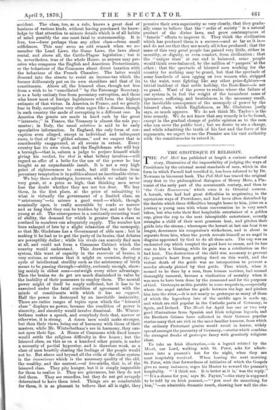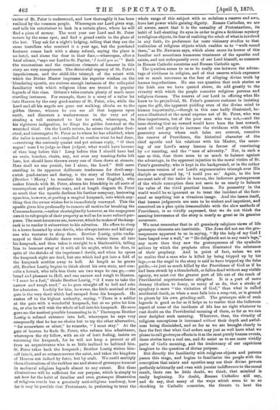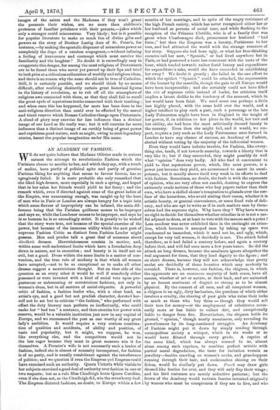THE GROTESQUE IN RELIGION. T HE P«11 Mill has published at
length a curious mediteval story, illustrative of the impossibility of judging the ways of Providence by the external moral standards of men, which in the form in which Parnell had versified it, has been referred to by Dr. Newman in his recent book. The Pall Mall has traced the original story first to the philosophical dialogues of Henry More, a Pla- tonist of the early part of the seventeenth century, and then to the Gesta Romanorum,' which owes it to Oriental sources. A hermit, who had had great difficulties in acquiescing in the mysterious ways of Providence, and had been often disturbed by the doubts which these difficulties brought home to him, joins on a journey a young man with whose conversation he is very much taken, but who robs their first hospitable entertainer of a golden cup, gives the cup to the next inhospitable entertainer, secretly strangles a child of their next generous host, and pitches their guide into the stream ; whereupon the hermit at last can bear it no longer, denounces his companion's wickedness, and is about to separate from him, when the youth reveals himself as an angel in disguise appointed by God to do all these acts. The cup was an enchanted cup which tempted the good host to excess, and its loss was to him a blessing, while its gain was a retribution on the bad hOst. The destruction of the child was necessary to prevent the parent's heart from getting fixed on this world, and the violent death of the guide was an interposition to prevent a murder already plotted by that guide. That which, when it seemed to be done by a man, from human motives, had seemed thoroughly immoral, became a vindication of morality when it was seen to have been done by the command and for the purposes of God. Grotesque as this parable in some respects is,—especially where the angel catches the guide between the legs and pitches him into the river,—it is not nearly so grotesque as many of those of which the legendary lore of the middle ages is made up, and which are still popular in the Catholic parts of Germany, in Spain, and Ireland. The Mooth for April has one or two very good illustrations from Spanish and Irish religious legends, and the Brothers Grimm have collected in their German popular stories many that are rich in the most familiar humour, from which the ordinary Protestant genius would recoil in horror, widely spread amongst the peasantry of Germany,—stories which combine the strangest freaks of grotesque fancy with genuinely religious ideas.
To take an Irish illustration,—in a legend related by the Month, our Lord, walking with St. Peter, asks for admit- tance into a peasant's hut for the night, when they are most hospitably received. When leaving the next morning St. Peter, with that forwardness of initiative of which the Gospels give so many instances, urges his Master to reward the peasant's hospitality. " '1 think not. It is better as it is,' was the reply." " ' It's a shame for you,' says St. Payter,"—the story is supposed to be told by an Irish peasaut,—" 'you MUSi do something for him,' "—an admirable dramatic touch, showing how well the cha- -racter of St. Peter is understood, and how thoroughly it has been realized by the common people. Whereupon our Lord gives way, and tells his entertainer to look in a certain place, where he will 'find a piece of money. The next year our Lord and St. Peter -return by the same spot, and find a grand castle in the place of .the hut. They ask for a night's lodging, telling that they are the same travellers who received it a year ago, but the powdered footman comes back with a sharp refusal, saying the place is no hotel, and slams the door in their face,—whereupon, after a brief silence, "says our Lord to St. Payter, '1 tould you so.'" Both -the unconscious and the conscious elements of humour in this story are very conspicuous. The dictatorial urgency of St. Peter's • impulsiveness, and the child-like triumph of the retort with -which the Divine Master impresses his superior wisdom on the 'blundering apostle, are curious enough instances of the colloquial familiarity with which religious ideas are treated in popular legends of this class. Grimm's tales contain plenty of much more startling instances. For example, there is a story of a tailor let dab) Heaven by the easy good-nature of St. Peter, who, while the Lord and all his angels are gone out walking, climbs on to the - golden throne, whence he can see all that happens upon -earth, and discovers a washerwoman in the very act of stealing a veil entrusted to her to wash, whereupon, in his righteous indignation, he flings the golden footstool at the wretched thief. On the Lord's return, he misses the golden foot- .stool, and interrogates St. Peter as to whom he has admitted; when -the tailor is accused, and compelled to confess what he had done, --receiving the curiously quaint and yet solemn reply, "0 thou -rogue! were I to judge as thou judgest, what would have become of thee long before this ? Long before this I should have had no seats, benches, chairs, nay, not even any toasting-forks left • here, but should have thrown every one of them down at sinners. Here shall no one punish, but I alone, the Lord." Still more startling in its apparent deliberate tenderness for devil-may- csrish good-nature and daring, is the story of Brother Lustig (Brother ' Merry,' to translate his name into English), who makes friends with St. Peter, abuses his friendship in all sorts of -unscrupulous and profane ways, and at length disgusts St. Peter . so much that the apostle declines his further company, bestowing . upon him, however, at parting a magical knapsack, into which any- thing that the owner wishes for is immediately conveyed. This the apostle gives him professedly to remove all motive for breaking the Commandments,—rather shortsightedly however, as the scapegrace uses it to rob people of their property as well as for more refined pur- poses. The most humorous use, however, which he makes of the knap- sack is to render it subservient to his salvation. He offers to sleep in a house haunted by nine devils, who always torture and kill any- one who ventures to sleep there. Brother Lustig, quite undis- mayed at their diabolic dance round him, wishes them all into his knapsack, and then takes it straight to a blacksmith's, telling him to hammer away at it with all his might, which he does, in spite of the shrieks of the imprisoned devils, and when he opens the knapsack eight are dead, but one which had got into a fold of the knapsack scuttles away to hell. At length as he grows old, Brother Lustig begins to think about his own state, and con- sults a hermit, who tells him there are two ways he can go,—one broad and pleasant to Hell, and one narrow and rough to Heaven. "I must be a fool," thinks Brother Lustig, "if I were to take the narrow and rough road," so he goes straight off to hell and asks for admission. Luckily for him, however, the little sentinel at the gate is the very devil which had escaped from his knapsack. He rushes off to the highest authority, saying, "There is a soldier at the gate with a wonderful knapsack, but at no price let him in, or else he will wish the whole of hell into his knapsack. He once gave me the nastiest possible hammering in it." Thereupon Brother Lustig is refused entrance into hell, whereupon he says very composedly that he has no choice but to try the other alternative, " for somewhere or other," he remarks, "I must stay." At the gate of heaven he finds St. Peter, who refuses him admittance, whereupon the sly fellow, with an air of hurt feeling, insists on returning the knapsack, for he will not keep a present at all from an acquaintance who is so little inclined to befriend him. St. Peter takes back the knapsack ; Brother Lustig wishes him- self into it, and so outmanceuvre,s the saint, and takes the kingdom .of Heaven not indeed by force, but by craft. We could multiply -these illustrations of the reckless use and abuse of grotesque humour in mediaaval religious legends almost to any extent. But these illustrations will be sufficient for our purpose, which is simply to ask how far the habit of familiar and even grotesque illustration of religious creeds has a genuinely anti-religious tendency, how far it may be possible that Protestants, in preferring to treat the
whole range of this subject with so sedulous a reserve and awe, have lost power while gaining dignity. Roman Catholics, we are all aware, assert that it is the unreality of Protestantism, its habit of half-shutting its eyes in order to give a fictitious mystery to religious objects, its fear of realizing the whole of whatis involved in any faith, its preference for mere visionary studies to that realization of religious objects which enables us to "-walk round them," as Dr. Newman says, which alone cause its horror of this familiar and sometimes humorous treatment of the apostles and saints, and not uufrequently even of our Lord himself, so common in Roman Catholic countries and Roman Catholic ages.
The question seems to us to be really one between the advan- tage of vividness in religion, and of that reserve which expresses not so much reverence as the fear of alloying divine truth by human imperfections. No one can question that such stories as the Irish one we have quoted above, do add greatly to the vivacity with which the people conceive religious persons and religious themes. The reserve of our Lord in offering what He knew to be prejudicial, St. Peter's generous rashness in insisting upon the gift, the apparent yielding even of the divine mind to human importunity,—though in this case badly illustrated, be- cause illustrated at the moral expense not of St. Peter, who was thus importunate, but of the poor man who was not,—and the issue showing that no reward would have been the best reward, must all tend greatly to increase the vividness with which the peasantry among whom such tales are current, conceive the reserve of Providence, the historical character of the chief apostle and his relations with his Master, the mean- ing of our Lord's many lemons in favour of convincing by not resisting, and the "uses of adversity." Nor, in such a case as this, does there seem to us much to balance against the advantage, in the apparent injustice to the moral victim of St. Peter's generosity, who is kept in the background, or in the rather humorous version of our Lord's argumentative triumph over His disciple as expressed by, 'I tould you so.' ,Again, in the less reverent tale of the tailor in heaven, the ludicrous grotesqueness of the whole conception does not seem to us nearly to balance the value of the vivid practical lesson. No peasantry in the world would be so ignorant as to treat the incident of the foot- stool as anything but a vivacious image. And the lesson itself, that human judgments are sure to be violent and impatient, and conceived on a plan quite irreconcilable with the slow methods of Providence, is so vividly expressed, that we do not think the seeming irreverence of the -story is nearly so great as its genuine reverence.
We must remember that in all genuinely religious views of life grotesque elements are inevitable. The Jews did not see the gro- tesqueness apparent to us in saying, "By the help of my God I have leaped over a wall," or "He delighteth not in any man's legs," any more than they saw the grotesqueness of the symbolic actions by which the prophets often illustrated the substance of their prophecy. And in point of fact, unless we are to realize that a man who is killed by being tripped up by his legs ,—as the angel in the story is said to have tripped up the false guide,—is just as much killed by the Providence of God as if he had been struck by a thunderbolt, or fallen dead without any visible agency, we must cut the greater part of life out of the reach of Providential superintendence altogther. It is a part of mere dreamy idealism to fancy, as many of us do, that a stroke of apoplexy is more "the visitation of God," than what is called accidental death, as when a man falls into a soap-vat, or is ground to pieces by his own grinding-mill. The grotesque side of such legends is good so far as it helps us to realize that the ludicrous aspect of some of the incidents of life has no right whatever to cast doubt on the Providential meaning of them, so far as we can ever decipher such meaning. Wherever, then, the vivacity of religious conceptions is increased without their depth and awful- ness being diminished, and so far as we are brought clearly to face the fact that what God orders may just as well have what we please to call grotesque effects in it as the most purely human events, these stories have a real use, and do assist us to see more vividly parts of God's meaning, and the irrelevancy of our capricious laughter to the question of divine purpose. -
But directly the familiarity with religious objects and persons passes this stage, And begins to familiarize the people with the conception that saints and apostles may use their divine powers perfectly arbitrarily and even with jocular indifference to the moral result, there can be little doubt, we think, that mischief is really beginning. No doubt, Roman Catholics will say, and do say, that many of the ways which seem to us so & shocking in Catholic countries, the threats to beat the images of the saints and the Madonna if they won't grant the peasants their wishes, are no more than children's pretences of familiar petulance with their parents,—jokes which only a stranger could misconstrue. Very likely ; but is it possible for popular literature to make so much fun of divine gifts and powers as the story of Brother Lustig does of St. Peter's, for instance,—by making the apostolic dispenser of miraculous power so completely the dupe of a careless scapegrace,—without infusing a feeling of irreverence and contempt which must survive the familiarity and the laughter? No doubt it is exceedingly easy to exaggerate this danger, for among the most religious of Protestants are to be found those who never yet pursed up their lips and tried to look prim at a ridiculous collocation of worldly and religious ideas, and there is no reason why the same should not be true of Catholics. Still, it is certainly possible, and we should think by no means 'difficult, after realizing distinctly certain great historical figures in the history of revelation, so to rub off all the atmosphere of religious awe connected with them, as that they shall fail to recall the great cycle of mysterious truths connected with their teaching ; and when once this has happened, far more has been done in the anti-religious direction than could ever be effected by the unreal and timid reserve which Roman Catholics charge upon Protestants. A cloud of glory may exercise far less influence than a distinct image of our Lord as He really was ; but it will exercise far more influence than a distinct image of an earthly being of great power and capricious good-nature, such as might, owing to such legendary stories, haunt the popular imagination under His name.




































 Previous page
Previous page